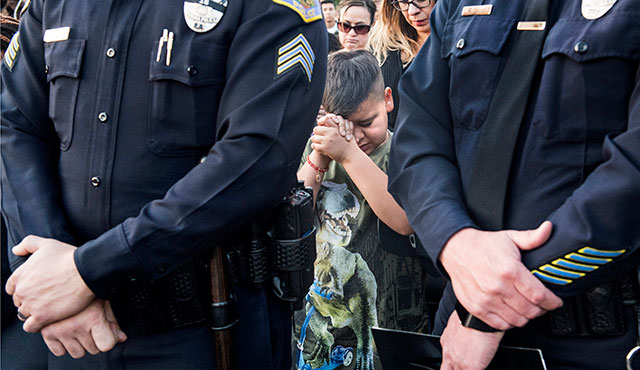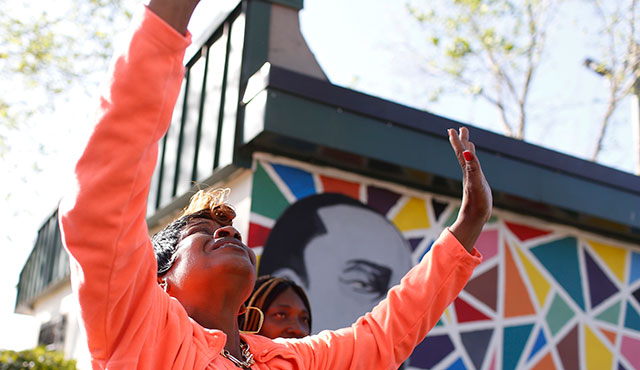Prayer – whether simple or structured, in a church or at home – is an intimate, essential and powerful connection to God. It is also a way to express one’s reliance on him.
“Our Catholic faith is all about being in (a) relationship with God and with each other,” said Fr. Christopher Smith, rector and Episcopal Vicar of Christ Cathedral in Garden Grove. “As in a human relationship, if we are to keep the relationship alive and healthy, there needs to be regular contact and communication. That is what prayer is all about.”
The fourth part of the Catechism of the Catholic Church is dedicated precisely to the question of prayer, said Pia de Solenni, chancellor of the Diocese of Orange.
“In essence, we pray because we need to escape ourselves and come into relationship with God who is the only one who can satisfy us,” said de Solenni, who earned her doctorate in sacred theology from the Pontifical University of the Holy Cross in Rome. “When we don’t pray, we’re stuck inside ourselves. Maybe we have friends, a therapist, etc., but all of these are limited beings. When we pray, we come into relationship with the Infinite. As we grow in prayer, we come to know the face of God – the Father, the Son, and the Holy Spirit. It is a deeply personal experience precisely because it is a deeply personal relationship.”
It is a link that becomes even more acute in times of hardship and need, and the prayer becomes an intercession.
“Intercession is asking God to participate in the events and circumstance of our lives,” Smith said. “Intercessory prayer means that we include God in our needs, desires and hopes that surround whatever is going on in our lives or the lives (of) others. Intercessory prayer means that we ask God for guidance, strength, insight, healing and wisdom on behalf of ourselves or others.”
In intercession, we model the prayer of Jesus, who intercedes with his Father for all of us, de Solenni said.
“The fact that we pray for others and that others pray for us reveals the relational aspect of our existence,” she said. “We are not in this alone. We are actually part of a family that is both human and divine.”
Prayer is especially important when we are scared or uncertain because in reaching out to God, we are acknowledging that we are not alone, Smith said.
“For most of us, fear and uncertainty heighten when we feel like we are alone and have no resources,” he said. “Reliance on God’s presence can be a great source of comfort and reassurance. That presence is acknowledged when we turn to God in prayer.”
These are the times when we can be wrongly convinced to despair and to give up hope, de Solenni said.
“Rather than suffocate ourselves in that uncertainty, we have the option of escaping that through prayer,” she said. “We may be faced with difficult situations, but prayer brings the authentic peace to weather any storm because it brings us into relationship with the three Persons who are God.”
In the aftermath of a tragedy, prayer can offer consolation and hope or healing for ourselves and for others, depending on the situation, de Solenni said.
“Tragedies force us to realize that we cannot get by on our own, that we need someone else and that someone has to be God,” she said. “Another human being is not enough. Success dupes us into thinking that we’re self-sufficient.”
Prayer can also help people see through and beyond the tragedy, Smith said.
“The prayer does not change the tragic event that happened, but it can change us in our capacity to navigate our way through the pain and to help others do the same,” he said.
Smith recalled the Gospel story in which Jesus was asleep in the boat during a terrible storm and the disciples who were with him were terrified.
“They could not understand how he could be sleeping in the midst this terrible storm that could kill them,” Smith said. “Wanting to first calm them by reassuring them of his presence, he eventually calms the wind and the sea.”
Prayer is about letting the Lord calm us first, so we will be able to face the storm, Smith said.
“Our tendency is to want the storms to be calmed first, thinking that when the storm is over, we will be calm,” Smith said. “For a person of faith, it is the other way around. Prayer is about first being calmed by the Lord. Now we are ready to face the storm.”


